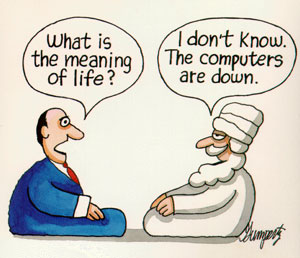I've been thinking about the reward of heaven and I'm really perplexed by the entire reward vs punishment setup that christianity and other derivative religions have created.
As a non-believer, any particular theist might suggest that I am going to burn in hell. Different people of exactly the same christian denomination interpret passages such as Revelation 21:8 in varying ways depending on a particular bent. For example, some might literally interpret the passage or some might interpret it as a metaphorical. One thing I know, is that christians, and theists from other derivative religions, want to avoid hell, literally or metaphorically, at all costs.
As a side note, I can't imagine what hell would be like.
Are there a bunch of brilliant scientists and atheists hanging off meat hooks, clotheslines and torture racks down in hell? Are non-believers being forced to do laps of a 50 meter pool of lava for eternity? Are they being subjected to the eternal gloating from kind hearted and pure christians sitting up in heaven? The absurdity of the scenario highlights that I can make up anything I like. Nobody can prove me wrong. Sounds a bit like religion to me.
I am also confused as to what form we take in hell, such that we can apparently experience the full gamut of pain sensations but not be there physically? I've seen first hand that if you do a spinal tap, you don't feel pain in your legs and lower body. So if my body is not there, what causes the pain? It is such an absurd notion. Maybe the all forgiving god inserts non-physical probes into your non-physical body and forgives you by inflicting endless non-physical pain on you?
Back to the original topic.
Is avoiding hell the only motivation for theists to behave and believe? Would they turn into uncontrollable criminals without the notion of eternal punishment? Not really, as there is the promised reward of heaven.
The draw card is huge. Follow the rules in this unverifiable book and you will avoid hell as well as receive the gift of eternal bliss in heaven. Given the option of going to heaven for eternal bliss versus hell and eternal torture, the choice is obvious. It's like asking, would you prefer a $1000 reward every day of your life or would you prefer to have your fingernails drilled into every day of your life.
So there seems to be two motivations :
1. Avoid punishment in Hell
2. Be rewarded with Heaven.
In the realm of reality, a typical justice system doesn't offer rewards for good behaviour. The general idea is that you get punished if you are proven guilty. This would be like the idea of no heaven but a certain hell. In this scenario you don't get a reward for doing the right thing, you are only avoiding punishment, much like reality. I do wonder how big a draw card religion would be if there was no heaven, and you only avoided punishment in hell if you followed the rules.
Take one step further and remove both motivations from the religious equation. No heaven and no hell.
As a non-believer, I don't think there is any heaven and I don't think there is any hell. I certainly won't be rewarded by heaven, as I'm clearly not worshipping an invisible spiritual thug. I don't need the reward of heaven to motivate me towards good. I don't need the threat of hell to motivate me to do good. Typically, a theist would suggest that this is the perfect framework for abominable behaviour. No reward and no punishment means a person drifts towards a cesspool of moral depravity.
What is actually far more surprising is that theists still act in horrific and abominable ways, even with the reward of heaven and punishment of hell in their minds. Now imagine how they would act given none of those constructs. It would be unimaginable.
Ultimately, there will be no reward of heaven for me. The universally undetectable bearded sky fairy only has eternal damnation and torture in mind for the non-believing kind, yet surprisingly, he will reward a priest child rapist with heaven.
Ultimately, there will be no reward of heaven for me. The universally undetectable bearded sky fairy only has eternal damnation and torture in mind for the non-believing kind, yet surprisingly, he will reward a priest child rapist with heaven.
That is just absurd.


